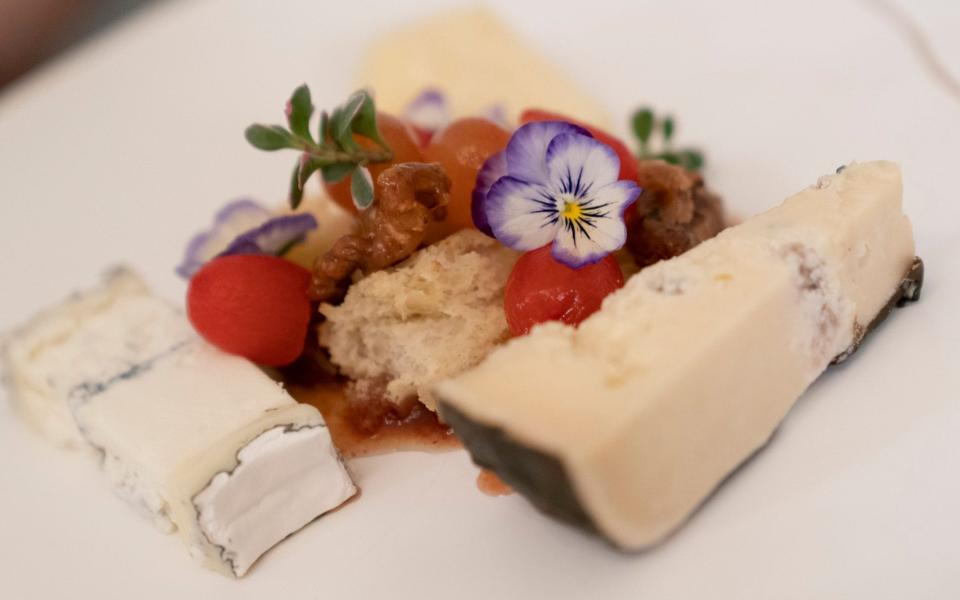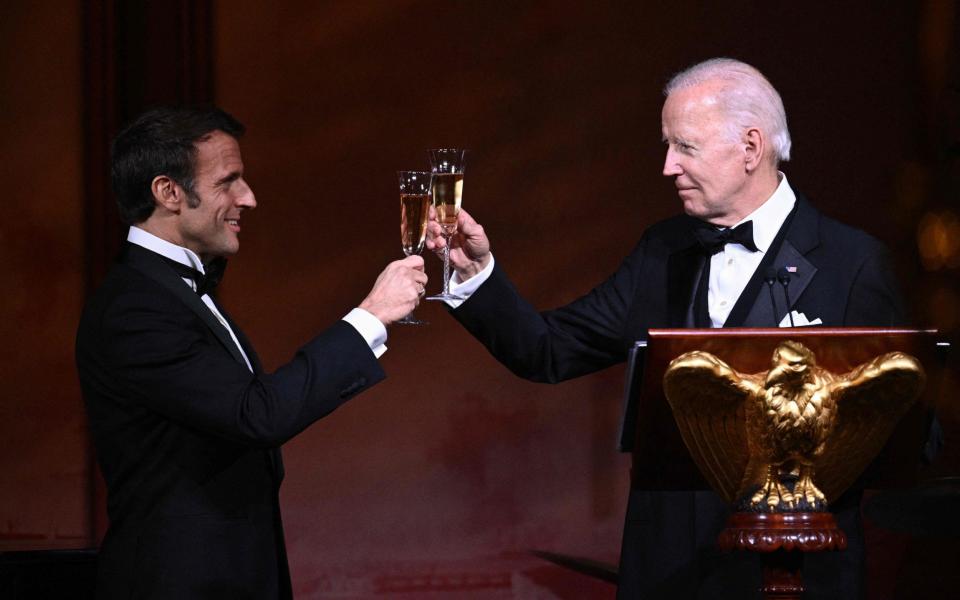Macron's White House menu proves that American cheese is no joke

After a period of frosty relations – last year’s submarine feud and Donald Trump and Emmanuel Macron’s disdain for one another – this week President Joe Biden sought to mend the Franco-American alliance with a lavish banquet for his French counterpart at the White House.
Biden and the First Lady, Jill, pulled out all the stops for the first official state dinner of the octogenarian’s presidency. Macron and his wife, Brigitte, were treated to caviar, butter-poached Maine lobster, squashes from the White House garden, American sparkling wine and… American cheese.
Serving local wine and cheese to the leader of France is a brave move and Jill, who was in charge of planning the dinner, is said to have pushed for American cheese. Easy Cheese spray cans and Trumpian orange Kraft slices? Far from it. Among the selection was Rogue River Blue, a raw cow’s milk blue from Oregon wrapped in pear-liqueur-soaked grape leaves and cave-aged for almost a year. Beat that, Roquefort.
Contrary to popular misconception, American cheese has come a long way. The Yanks now make some of the best in the world. In 2019, Rogue River Blue picked up the top prize at the World Cheese Awards – the first time for an American cheese. Journalist and cheese expert Patrick McGuigan describes it as being “nothing like I’ve ever tried before”.
Having tasted it myself, I agree: it’s creamy, salty, spicy, with boozy notes and crystals similar to those found in a good cheddar. One French newspaper snidely described its victory at the time as “sacrilege”.

At this year’s awards, Greensward, a creamy cow’s cheese made in Vermont, finished in seventh place, ranking higher than any British cheese (though below two French ones). The Mont d’Or-style cheese was described by cheese consultant Emma Young as “lovely, with a concentrated, brothy, mushroomy flavour”. She says many people in the industry consider another Mont d’Or-style American product, Rush Creek Reserve from Uplands Cheese in Wisconsin, as even better than the original.
How, then, did American cheese go from derided to world-class? America pioneered industrialised, long-life cheese, and the vast majority of American cheese is still mass-produced and bland. But, much like the movements in organic food, craft beer, natural wine and sourdough bread – many of which bubble up in trendy American regions such as San Francisco – the USA also has a bustling artisan cheese scene. States like Vermont and Oregon are at the forefront, as is the traditional cheese capital of Wisconsin.
High-end supermarkets such as Whole Foods, which has 500 stores, have cheese counters that put Waitrose and M&S to shame. The American Cheese Society, founded in 1983, has done much to promote homegrown artisan cheese, and says that there are now about 1,000 artisan cheesemakers in the US.

Quality cheese was always available in the US on a small scale. Yet, without strong (albeit somewhat stifling) traditions such as those found in France or Italy, American cheesemakers have been free to experiment. Tom Vella, the founder of Rogue Creamery, which makes Rogue River Blue, based the recipe on Roquefort, but took ideas from all over Europe, too.
Wheels of Greensward, meanwhile, are washed in cider and the cheese has notes of brandied cherry. Barely Buzzed, made by Beehive Cheese in Utah, is covered in coffee and is a perfect example of how experimentation has resulted in unique and intriguing cheeses that can’t be found anywhere else.
Another of McGuigan’s recommendations from across the pond is Harbison, a soft, bloomy-rind cheese made in Vermont by the team at Jasper Hill, whom Young says are “trailblazers for the most amazing artisanal cheese in the US. Their cheese is really, really special.” She cites their Bayley Hazen Blue as “one of the best blues I’ve ever tasted”.
British turophiles will be hard-pressed to find some, since (quality) American cheese is rare in the UK, partly due to high tariffs, though it is expensive in its homeland, too. Most cheesemongers The Telegraph contacted don’t stock any, although London’s La Fromagerie stores carry Rogue River Blue.

When Young worked at Whole Foods in Britain 10 years ago she recalls there would always be Rogue River Blue and Pleasant Ridge Reserve from Uplands Cheese available at Thanksgiving, with the former then selling for £80-£90/kg. “They are a hard sell because you have to sell them in really small portions; people don’t want to spend £30 on a normal-size chunk of cheese,” she says.
Things may be changing. At La Fromagerie, Rogue River Blue costs £117.10/kg, though senior cheesemonger Max Melvin says it nevertheless sells very well – even among French customers. Melvin says they buy it first “for the shock value of [serving] decent American cheese, then because it’s incredibly unique and one of the best cheeses in the world”.
It is time, then, to distinguish between “American cheese” and American cheese. The former, individually plastic-wrapped and arguably plastic-textured, wouldn’t give a Comté, Roquefort or Brie a run for their money. The latter – high-quality and produced by the country’s most innovative cheesemakers – may just spark a new bromance between Biden and Macron.

 Yahoo Movies
Yahoo Movies 
